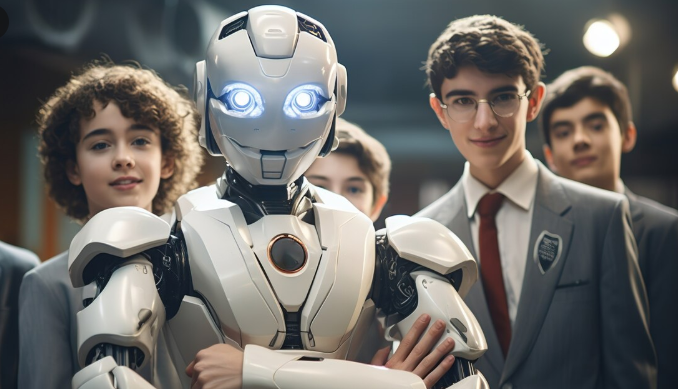Automation and artificial intelligence (AI) are transforming the workplace, reshaping industries, and redefining the nature of jobs. As machines take over repetitive tasks, new opportunities and challenges emerge for workers and businesses alike. While automation promises increased productivity and efficiency, it also raises concerns about job displacement, workforce adaptation, and the future role of human labor.
This article explores how automation is reshaping the job market, which industries will be most affected, and how workers can prepare for this inevitable transformation.
1. How Automation is Changing the Workforce
Automation refers to the use of machines, AI, and robotics to perform tasks that previously required human labor. This shift is driven by advancements in:
- Artificial Intelligence (AI): Machines are now capable of learning, decision-making, and problem-solving.
- Robotics: Automated machines can perform complex physical tasks in industries like manufacturing and healthcare.
- Big Data and Analytics: AI-powered systems analyze vast amounts of data to optimize business operations.
- Internet of Things (IoT): Smart devices communicate and automate processes without human intervention.
These technologies are reshaping the workplace by replacing some jobs, transforming others, and creating entirely new opportunities.
2. Industries Most Affected by Automation
1. Manufacturing and Warehousing
Automation has already revolutionized manufacturing with robotic assembly lines and automated quality control. Companies like Tesla, Amazon, and Foxconn use AI-powered robots to increase efficiency and reduce costs.
🔹 Jobs at Risk: Assembly line workers, warehouse operators, and forklift drivers.
🔹 New Opportunities: Robotics technicians, AI maintenance engineers, and automation specialists.
2. Transportation and Logistics
Self-driving vehicles and drones are transforming logistics, reducing the need for human drivers and delivery personnel. Companies like Tesla, Waymo, and FedEx are developing autonomous trucks and drones for package delivery.
🔹 Jobs at Risk: Truck drivers, delivery workers, taxi drivers.
🔹 New Opportunities: AI logistics coordinators, drone operators, and fleet automation managers.
3. Retail and Customer Service
Self-checkout systems, AI chatbots, and automated inventory management are reducing the need for cashiers and customer service representatives.
🔹 Jobs at Risk: Cashiers, retail clerks, call center employees.
🔹 New Opportunities: E-commerce specialists, chatbot designers, and AI-driven customer experience analysts.
4. Healthcare and Medicine
AI-driven diagnostics, robotic-assisted surgeries, and automated administrative tasks are changing healthcare. AI-powered tools can detect diseases, recommend treatments, and assist doctors.
🔹 Jobs at Risk: Medical transcriptionists, administrative staff, and some diagnostic roles.
🔹 New Opportunities: AI healthcare analysts, robotic surgery technicians, and biomedical engineers.
5. Finance and Banking
AI-driven financial models, robo-advisors, and automated trading platforms are replacing human financial analysts and bank tellers.
🔹 Jobs at Risk: Bank tellers, accountants, financial analysts.
🔹 New Opportunities: AI financial advisors, blockchain specialists, and cybersecurity experts.
3. The Rise of New Jobs and Skills
While automation is eliminating some jobs, it is also creating new opportunities in emerging fields. The key to surviving the automation wave is adaptability.
Skills That Will Be in High Demand
- Artificial Intelligence and Machine Learning: Understanding AI algorithms and data analytics.
- Robotics and Automation Engineering: Designing and maintaining automated systems.
- Cybersecurity: Protecting automated systems from cyber threats.
- Creative Problem-Solving: Innovation and adaptability in a tech-driven world.
- Emotional Intelligence and Human Interaction: Skills that machines cannot replicate, such as empathy and negotiation.
The future job market will favor those who can work alongside automation rather than compete against it.
4. How Workers Can Prepare for the Automated Future
1. Lifelong Learning and Upskilling
Continuous education will be essential. Workers should:
✅ Learn coding, AI, and data science.
✅ Take online courses on platforms like Coursera, Udemy, and LinkedIn Learning.
✅ Attend workshops and industry training programs.
2. Emphasizing Human-Centric Skills
While AI excels at repetitive tasks, humans are better at creativity, leadership, and emotional intelligence. Jobs that require:
🔹 Complex decision-making (CEOs, strategists, researchers).
🔹 Social interaction (therapists, teachers, salespeople).
🔹 Creativity (artists, writers, designers).
These roles will be harder to automate.
3. Adapting to New Work Environments
- The rise of remote work and gig economy jobs means traditional employment models are changing.
- More people will work in freelancing, digital entrepreneurship, and flexible jobs.
5. The Ethical and Economic Impact of Automation
Economic Implications
- Increased Productivity: Companies will produce more goods at lower costs.
- Job Displacement: Some workers may struggle to transition into new roles.
- Wealth Inequality: Automation may concentrate wealth among corporations and AI developers.
Ethical Concerns
- Who Benefits from Automation? Will companies prioritize profits over workers’ well-being?
- Data Privacy and AI Bias: Automated hiring and decision-making systems could introduce biases.
- Universal Basic Income (UBI): Some experts propose UBI as a solution to job losses due to automation.
Governments, businesses, and workers must collaborate to ensure that automation benefits everyone—not just a select few.
6. The Future of Work: A Hybrid Workforce
Rather than replacing all human jobs, automation is likely to create a hybrid workforce where humans and machines collaborate.
What Will Work Look Like in 2030 and Beyond?
- AI and humans working together: AI handles repetitive tasks, while humans focus on creativity and decision-making.
- Flexible work environments: More remote work, freelancing, and digital jobs.
- A focus on innovation: Workers who can adapt, learn, and innovate will thrive.
Conclusion
Automation is reshaping the future of work forever, transforming industries and redefining job roles. While some jobs will disappear, new opportunities will emerge in AI, robotics, and creative fields. The key to success in an automated world is adaptability, continuous learning, and embracing technology rather than fearing it.
As we move into this new era, businesses, governments, and workers must work together to ensure a future where technology enhances human potential rather than replacing it. The future of work isn’t about machines taking over—it’s about humans and technology evolving together.


